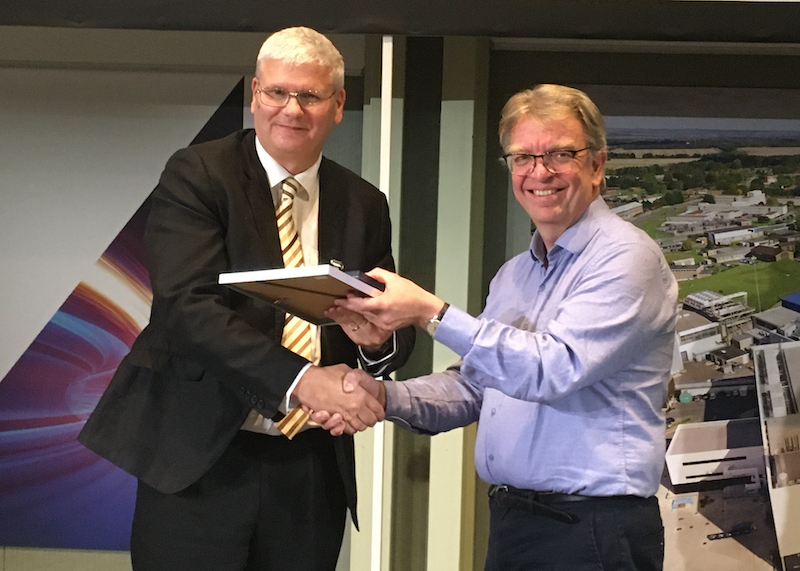
The UK Catalysis Hub have named Professor Stuart Taylor from Cardiff University as winner of the Sir John Meurig Thomas Catalysis Medal at the UK Catalysis Hub Winter Conference on the 29th of November 2022. Professor Stuart Taylor was selected from the nominations for top mid-career scientists working in the United Kingdom to win the medal for 2022. Judges of this year’s Sir John Meurig Thomas Medal said, “We had a number of excellent applications but what really stood out was the impact of Stuart’s work in its application to address the target problem, as well as clear future impact” and “were struck by the clear, demonstrable impact of his work in terms of environmental protection (the REF case study 2021), but also how this was combined with numerous impressive outputs across many other areas of catalysis. Achieved through sustaining a very high level of contributions for many years.”
Professors Hutchings and Catlow agreed that it was most fitting that Stuart receives this recognition. “He has made many seminal contributions to heterogeneous catalysis translating fundamental catalysis into everyday use applications. He has pioneered innovative approaches to the synthesis of heterogeneous catalysts, developing fundamental understanding of catalytic processes. His catalyst discoveries are used in many commercial applications today benefiting society.”
The medal honours the achievements of Sir John Meurig Thomas, a distinguished professor in the field of catalysis who sadly passed away in 2020. He was a remarkable man and one of the most eminent figures in catalytic science in the past 100 years, who was a pioneer in many of the techniques and concepts that have now become standard in the field. He was generous with his time and support for the UK Catalysis Hub and its events and the Hub is proud to have established 2016 an annual award in honour of his achievements. He will be missed by scientists in the Hub community and worldwide. The Sir John Meurig Thomas medal was presented at the end of a symposium on the first day of the conference in honour of Sir John Meurig Thomas’s scientific achievements.
Professor Stuart Taylor delivered a lecture on catalysis to the UK Catalysis Hub Winter conference attended by over 100 people. He said on winning, “It is a privilege and a great honour to be awarded the 2022 JMT medal. I met Sir John many times, especially in his role as visiting Professor at Cardiff. He was always encouraging and enthusiastic and very gracious with his time and guidance, and his pioneering work influenced my own research. The award of the JMT medal reflects achievements over many years, and I am truly grateful to all of my students, colleagues and collaborators that have contributed and supported me.”
Professor Stuart Taylor’s work has focused on developing synthesis approaches to heterogeneous catalysts, delivering fundamental understanding of catalytic processes. Establishing relationships between catalyst structure and activity across a range of metal-nanoparticle and metal-oxide catalysts has driven the rational design of new catalysts, delivering impact across the important areas of energy, sustainability, green chemistry, and environmental protection. In particular, research has shaped environmental catalysis for life support and atmospheric emission control, including the discovery of highly-active copper manganese, nanocrystalline cobalt and cerium-based oxide catalysts. Catalyst preparation has also been exploited for upgrading inexpensive abundant feedstocks to more useful chemicals in sustainable approaches. Recent projects have pioneered bi-metallic supported nanoparticle catalysts for direct conversion of carbon dioxide to synthetic fuels, an important process for meeting net zero carbon targets.
Speakers for the Catalysis Hub Winter conference included members of the Catalysis Hub and wider international catalysis community. The JMT medal was generously sponsored by BP, JM, Dr. Reddy’s, Givaudan and Royal Society of Chemistry Applied Catalysis Group.
Watch a recording of Prof. Stuart Taylor’s presentation below:
Further Information
Highlight Papers:
AM. Bowker, N. Lawes, I. Gow, J. Hayward, J. Ruiz Esquius, N. Richards, T.J.A. Slater, T.E. Davies, N.F. Dummer, L. Kabalan, A. Logsdail, R.C. Catlow, S.H. Taylor, G.J. Hutchings, The critical role of βPdZn alloy in Pd/ZnO catalysts for the hydrogenation of carbon dioxide to methanol, ACS Catal., DOI: 10.1021/acscatal.2c00552
M. Douthwaite, N. Powell, A. Taylor, G. Ford, J.M. López, B. Solsona, N. Yang, O. Sanahuja‐Parejo, Q. He, D.J. Morgan, T. Garcia, S.H. Taylor, Glycerol selective oxidation to lactic acid over AuPt nanoparticles: Enhancing reaction selectivity and understanding by support modification, ChemCatChem, 12, (2020), 3097 – 3107. DOI: 10.1002/cctc.202000026
T. García, J.M. López, B. Solsona, R. Sanchis, D.J. Willock, T. Davies, L. Lu, Q. He, C.J. Kiely, S.H. Taylor, The key role of nanocasting in gold-based Fe2O3 nanocasted catalysts for oxygen activation at the metal-support interface, ChemCatChem, 11, (2019), 1915 – 1927. DOI: 10.1002/cctc.201900210




